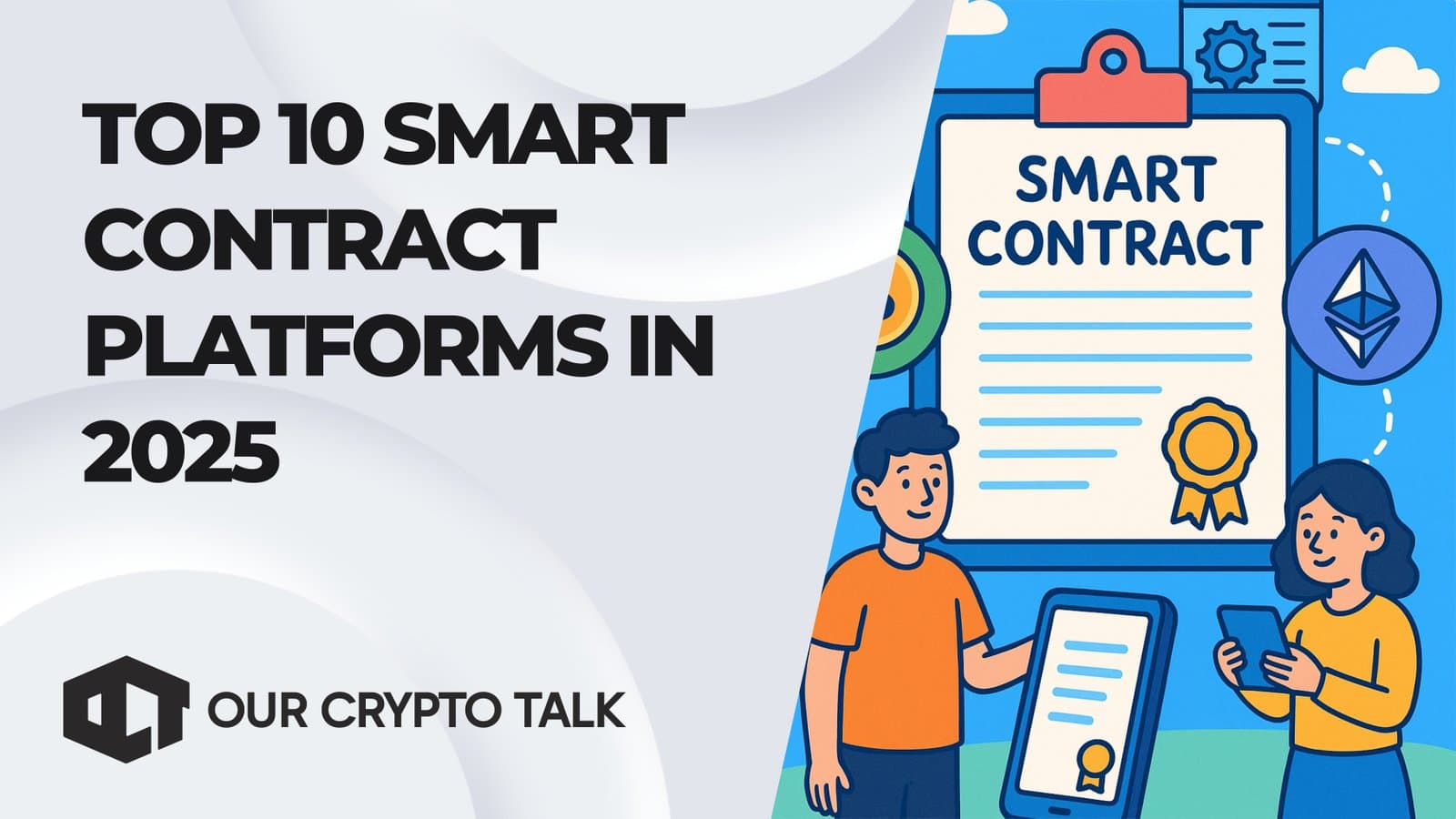
Explore the Top 10 Smart Contract Platforms in 2025 powering DeFi, NFTs, and Web3 innovation with speed, security, and scalability.
Author: Akshat Thakur
Published On: Wed, 29 Oct 2025 11:06:44 GMT
Smart contract platforms are transforming how digital agreements work. These self-executing contracts, stored on a blockchain, automatically perform actions when predefined conditions are met no banks, brokers, or middlemen required. They’ve become the backbone of decentralized finance (DeFi), NFTs, gaming, supply chain automation, and even corporate governance.
However, with dozens of blockchains claiming to offer the fastest, cheapest, or most secure environment for smart contracts, choosing the right one can be overwhelming. The decision affects your transaction speed, fees, security, and even the success of your dApp or project. In 2025, the global smart contracts market is projected to reach $3.21 billion, growing at a CAGR of 22% proof of just how competitive this space has become.
This guide explores the Top 10 Smart Contract Platforms in 2025, breaking down their scalability, security, developer support, and ecosystem maturity to help you choose the one best suited for your goals.

Smart contracts automate trust. Once deployed on a blockchain, they execute predefined rules automatically whether transferring funds, minting NFTs, or verifying user access. Each action is transparent, traceable, and irreversible, eliminating human error or fraud.
They’re written in specialized programming languages (like Solidity or Rust) and live on blockchain networks such as Ethereum, Solana, or Cardano. These networks provide the environment or the “virtual machine” for smart contracts to operate. In practice, smart contracts are the reason decentralized apps (dApps), decentralized exchanges (DEXs), and decentralized autonomous organizations (DAOs) can function without intermediaries.
Smart contracts matter because they shift control from centralized entities to code a fundamental step toward true decentralization.
When selecting a smart contract platform, it’s important to evaluate several critical factors that determine usability, cost, and scalability:
The right choice depends on your project’s needs DeFi developers may prioritize speed and liquidity, while enterprises might focus on compliance and stability.
Ethereum remains the leader in smart contract development, supported by the largest ecosystem of developers, tools, and dApps. With the transition to Proof of Stake and Layer-2 scaling solutions, Ethereum combines security with growing scalability.
Ethereum continues to set the standard for smart contract innovation, making it the go-to choice for developers worldwide.

Built for speed and affordability, Binance Smart Chain (now BNB Chain) offers Ethereum compatibility with much lower gas fees. Its Proof of Staked Authority (PoSA) consensus provides fast confirmations and reliable security.
BSC’s affordability and speed make it a favorite for startups and developers looking to scale quickly.

Cardano combines academic rigor with decentralized innovation. Its unique Proof-of-Stake algorithm, Ouroboros, ensures high security and energy efficiency. Smart contracts run on Plutus, a Haskell-based language designed for mathematical precision.
Cardano’s data-driven development approach appeals to developers who value long-term stability and predictability.

Solana is designed for speed. Using its innovative Proof of History mechanism, it can process over 65,000 transactions per second at minimal fees. Ideal for NFTs, games, and high-throughput DeFi protocols, Solana is pushing performance boundaries.
Despite past network outages, Solana’s performance and developer support continue to make it a dominant force.

Polkadot’s unique parachain architecture allows different blockchains to interconnect and share data securely. It’s built for scalability, interoperability, and flexibility across multiple use cases.
Polkadot’s ecosystem fosters innovation, allowing developers to launch specialized chains that connect seamlessly with others.

Smart contract platforms are more than just technical foundations they’re the infrastructure of the decentralized economy. Every DeFi protocol, DAO, or NFT marketplace depends on them to operate autonomously and securely.
Without these platforms, blockchain applications would be static and limited. The innovation happening in gaming, finance, AI, and supply chain all ties back to programmable contracts. As billions flow through decentralized ecosystems, the reliability of these platforms defines Web3’s credibility.

Avalanche combines speed, low fees, and eco-efficiency. Its subnet architecture allows developers to create custom blockchains with specific rules and governance.
Avalanche’s modularity gives developers unmatched control over performance, making it ideal for both enterprises and dApp builders.

Tezos stands out for its self-amending governance it upgrades itself without hard forks. Its focus on security, efficiency, and sustainability has earned it attention from institutions and NFT marketplaces.
Tezos’ ability to evolve seamlessly positions it as one of the most future-ready smart contract platforms.

Polygon enhances Ethereum scalability with its Layer-2 solutions. It’s ideal for developers wanting Ethereum compatibility without high costs.
Polygon bridges Ethereum’s power with mass adoption potential, becoming a key player in Web3 infrastructure.

Arbitrum uses optimistic rollups to scale Ethereum efficiently. It offers developers low-cost, high-speed smart contract deployment without sacrificing security.
Arbitrum is now a critical layer in Ethereum’s scalability stack, accelerating adoption through simplicity and reliability.

Cosmos enables interoperability between different blockchains using its IBC (Inter-Blockchain Communication) protocol. Developers can build independent yet connected chains tailored to specific use cases.
Cosmos leads the push toward a connected blockchain future where data and assets move freely between networks.

The future of smart contracts lies in automation, AI, and real-world integration. As enterprises adopt blockchain, contracts will interact directly with off-chain systems, supply chains, and IoT devices. Interoperable frameworks like Polkadot and Cosmos will play a key role in enabling seamless data exchange.
Meanwhile, Layer-2 solutions like Arbitrum and Polygon are bridging scalability gaps, making smart contracts viable for global adoption. Expect hybrid contracts combining on-chain execution with AI decision-making, particularly in finance and logistics.
Smart contracts are the foundation of blockchain’s promise transparent, secure, and unstoppable automation. The Top 10 Smart Contract Platforms we explored prove that innovation in this space isn’t slowing down. Ethereum continues to dominate, but newer players like Solana, Avalanche, and Polkadot are shaping the future through speed, interoperability, and customization.
As 2025 unfolds, the winning platforms will be those that strike the perfect balance between scalability, affordability, and trust paving the way for a truly decentralized digital economy.

